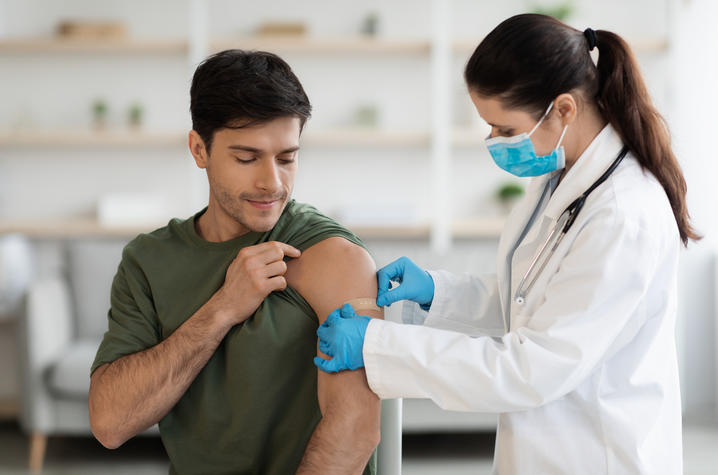Measles: how to protect yourself and Kentucky’s children

The University of Kentucky Public Relations & Strategic Communications Office provides a weekly health column available for use and reprint by news media. This week's column is by Nicholas Van Sickels, M.D., infectious disease specialist and the director of infection prevention and control at UK HealthCare.
LEXINGTON, Ky. (April 29, 2024) – Over two decades ago, measles – a highly contagious and potentially deadly childhood disease – was declared eliminated in the United States. As of April 18, at least 125 measles cases have been recorded nationwide this year – more than double the amount of cases observed in all of 2023.
Measles most commonly affects unvaccinated children and 20-40% of infected children require hospitalization. Ear infections, pneumonia, long-term neurologic issues and even death can occur. In general, most will recover, but some will have complications from the infection.
The sharp increase in cases is due to:
- A national and international decline in measles vaccination rates.
- International travel to areas with active outbreaks.
- The extreme contagiousness of the measles virus. On average, one infected person can infect 9-10 other people, if unvaccinated.
Experts still consider measles to be eliminated in the U.S. but that could change if we don’t continue to take proper preventative measures. In response to the increase in cases, the Centers for Disease Control and Prevention has issued warnings to health professionals and the general public throughout the spring.
How do I protect myself from measles?
Fortunately, the best tool for preventing a measles infection is still highly effective. Measles is almost entirely preventable through vaccination.
- One dose of measles, mumps, and rubella (MMR) vaccine is 93% protective.
- Two doses – the recommended number – are 97% protective against the disease.
Because of the inherent contagiousness of measles, 95% or more of a population needs to be vaccinated for the entire population to be protected from an outbreak.
- Currently the U.S. has 93.1% vaccination coverage.
- Kentucky has 91.6% coverage (of greater than one dose of MMR vaccine).
This last week of April is World Immunization Week – a good opportunity to discuss the importance of measles vaccination with family and friends, especially those who are planning to travel internationally or to parts of the U.S. where a measles outbreak is active. The latest tracking of measles cases and more information about the disease can be found on the CDC’s measles webpage.
What are the symptoms of measles?
Measles symptoms typically include:
- Fevers (can be very high)
- Cough
- Runny nose
- Red eyes
After the above symptoms, the characteristic red rash appears, starting from the head and spreading downward.
People with measles are thought to be contagious from about four days prior to developing the rash to four days after the onset of the rash (with the onset being day zero).
What to do if you think you’ve been exposed
If you’re concerned you or your child have been exposed to measles, contact your health care provider immediately.
Many of us, fortunately, have never seen a case of measles in our lifetime. With a renewed focus on prevention, hopefully, we never will.
UK HealthCare is the hospitals and clinics of the University of Kentucky. But it is so much more. It is more than 10,000 dedicated health care professionals committed to providing advanced subspecialty care for the most critically injured and ill patients from the Commonwealth and beyond. It also is the home of the state’s only National Cancer Institute (NCI)-designated Comprehensive Cancer Center, a Level IV Neonatal Intensive Care Unit that cares for the tiniest and sickest newborns and the region’s only Level 1 trauma center.
As an academic research institution, we are continuously pursuing the next generation of cures, treatments, protocols and policies. Our discoveries have the potential to change what’s medically possible within our lifetimes. Our educators and thought leaders are transforming the health care landscape as our six health professions colleges teach the next generation of doctors, nurses, pharmacists and other health care professionals, spreading the highest standards of care. UK HealthCare is the power of advanced medicine committed to creating a healthier Kentucky, now and for generations to come.




